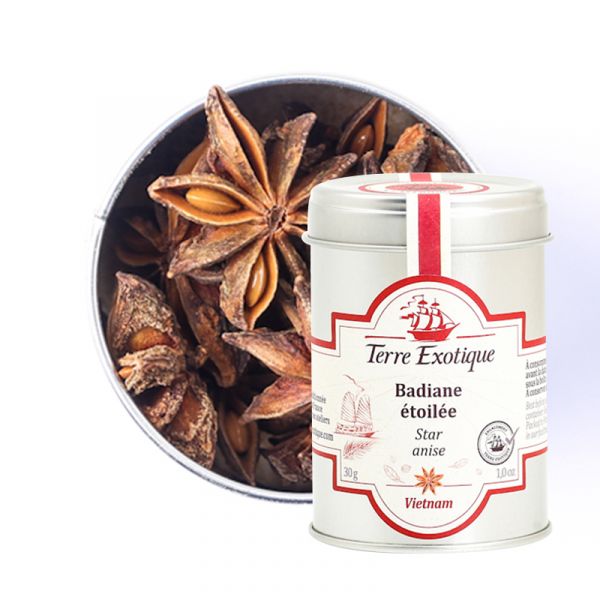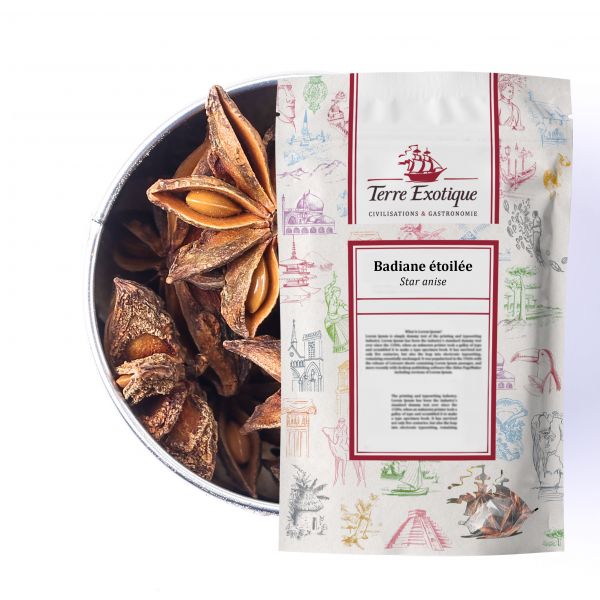





Culinary Use of Star Anise (or Aniseed Star)
Star anise, with its enchanting flavors, is a fantastic spice to enhance your everyday dishes!
Star anise, also known as aniseed star, is a versatile spice as it is used in both savory and sweet dishes and even in beverages. It can be used crushed, ground, grated, or whole.
Star anise pairs wonderfully with fruity desserts. It can be added whole or ground to your desserts, such as compotes, jams, and marmalades. Star anise is the perfect ally for all your pastries and goes well with cinnamon and ginger. Grate it into your creamy desserts (crème brûlée, rice pudding, custard) to add a touch of originality! Star anise also accompanies your savory dishes. It blends perfectly when infused in broths, sauces, and marinades, delicately enhancing fish and white meats.
Try it in your soups and creamy soups; it subtly enhances the flavors of your dish. Star anise is widely used in Chinese cuisine. You can add it to a vegetable or noodle stir-fry.
Star anise has more than one trick up its sleeve! Indeed, it is even used in beverages. It will perfume teas, infusions, and even milk-based and/or chocolate-based drinks. When added to punch, mulled wine, or rum, star anise becomes a great success.
Here are our recipe ideas for using star anise in your sweet preparations:
- - homemade apple juice with star anise: pour apple juice into a saucepan, then add 2 star anise and sugar and let it steep for about ten minutes;
- - star anise cream: in a saucepan, heat 2 star anise with milk and cream until simmering, then let it steep for another 10 minutes;
- - beef and its broth with star anise: in a wok, add 4 star anise to the broth, then let it simmer over low heat for 5 minutes;
- - star anise chocolate cream: in a saucepan, heat 1 star anise with the cream until simmering, then remove the star anise and mix the cream with chocolate;
- - roast veal with star anise and pears : after 30 minutes of cooking the veal and pears, place 4 star anise in the dish, then leave it in the oven for another hour, basting the roast and pears regularly, then serve.
Star Anise (also known as Aniseed Star), a Spice with Comforting Flavors
Star anise has a very aniseed taste, reminiscent of green anise seeds. It is, in fact, for this reason that it is called aniseed star. Star anise is highly fragrant and has flavors resembling licorice and fennel. Its fresh and sweet notes balance perfectly and give star anise characterful aromas.
Star Anise and its Botany
Focus on Star Anise, the Fruit of the Chinese Star Anise Tree
Star anise is the fruit of the Chinese star anise tree, a shrub whose botanical name is Illicium verum. Star anise forms an eight-branched star. The flavor of star anise is mainly concentrated in the pericarp, while the brown seeds are less aromatic.
How does Star Anise grow?
Star anise is harvested twice a year in China, between April and October. All production stages are entirely manual, and drying is done under the sun. Star anise is cultivated in four provinces of China: Fujian, Guangdong, Guangxi, and Yunnan.
History and Culture of Star Anise
The Origins of Star Anise
Star anise is native to China. Its Chinese name is "Badjiao," which translates literally to "Eight Horns," referring to the eight branches that form the star. This spice is traditionally used whole in infusions or ground in the Chinese five-spice blend. Star anise, or Chinese fennel, was introduced to Europe by Marco Polo in the 14th century.
In the Middle Ages, the spice was difficult to acquire, mainly due to its very high price, which made it a rare spice. It wasn't until the Renaissance and its importation by the English that its consumption became widespread in Europe.
Benefits of Star Anise
Star anise has numerous benefits. It soothes the throat and cough, contributing to respiratory health. Star anise also aids digestion and supports intestinal health and the immune system.
| Allergen | Absence |
|---|---|
| Native country | VIETNAM |
| Genus and botanical species | Illicum verum |
| Ingredients | star anise |
| TRACES EVENTUELLES D'ALLERGÈNES | céleri, sésame, moutarde, fruits à coques. |
 Français
Français 
